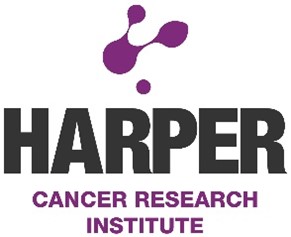| Harper Cancer Research Institute (HCRI) |
 |
|
| 1234 N. Notre Dame Ave., South Bend, IN 46617 harpercancer.nd.edu Contact: Andrew Bullock, sabullock@nd.edu |
Education and Research | |
| Role(s) | • The fight against cancer requires a team-approach and HCRI brings researchers and clinicians from several different backgrounds to help create efficient and effective research team. • HCRI serves as a conduit that translates basic laboratory science into advances in clinical cancer care by engaging partners in academia and industry • HCRI is dedicated to training the next generation of cancer researchers |
| Mission | Innovative and integrative research confronting the complex challenges of cancer |
| History | 2011 – With the opening of Harper Hall, HCRI launched as a collaboration between the University of Notre Dame and the Indiana University School of Medicine – South Bend with co-directors from each institution. 2012 – HCRI opens a Tissue Biorepository 2013 – The co-director approach ends and M. Sharon Stack is promoted to Director. 2019 – HCRI completes most recent external review with endorsements on strategic priorities in basic and translational research, training future oncology leaders, and engaging partners to address cancer health disparities. |
| Org | 68 affiliated faculty members from the University of Notre Dame College of Science, College of Engineering, College of Arts & Letters, College of Business and the Indiana University School of Medicine – South Bend Administrative staff of eight, including the HCRI Tissue Biorepository Leadership: • M. Sharon Stack, PhD, The Ann F. Dunne and Elizabeth Riley Director • Stewart A. Bullock, PhD, MBA, Associate Director Executive Committee: • Basar Bilgicer, PhD, Associate Professor of Chemical and Biomolecular Engineering • Brian Blagg, PhD, Charles Huisking Professor of Chemistry • Laurie Littlepage, Ph.D., Campbell Family Associate Professor of Cancer Research • Pinar Zorlutuna, PhD, Sheehan Family Collegiate Professor of Engineering |
| Board | External Advisory Board: advise on the scientific direction of HCR and evaluate the institute programs and research. • M. Eileen Dolan, PhD, University of Chicago • Paul J. Hergenrother, PhD, University of Illinois • Beatrice Knudsen, MD, PhD, Cedars-Sinai Medical Center • Lynn M. Matrisian, PhD, MBA, Pancreatic Cancer Action Network • Tom O’Halloran, PhD, Northwestern University • Cynthia Reinhart-King, PhD, Vanderbilt University • Anil K. Sood, MD, MD Anderson Cancer Center • Campus Advisory Board: Designs and helps implement synergistic opportunities with other facets of the University of Notre Dame. • Industry Advisory Board: provides feedback and insight to HCRI faculty to facilitate industry collaborations, assist HCRI trainees as they launch their careers, and help launch startup companies. • Community Engagement Steering Committee: address the needs of local cancer patients and help HCRI coordinate with community organizations to design impactful interventions. |
| Finance | Annual support from the University of Notre Dame Affiliated faculty annually generate around $40M in peer-reviewed funding |
| Data Source | • The institute and its affiliated researchers have several sources of data. Most of these are specific to the particular researcher or project. • Storage and annotation of mouse tumor models • Annotation on samples included in the HCRI Tissue Biorepository |
| Data Access | Data goes through a process including a data sharing agreement and security review. Notre Dame Research reviews and approves all Data Sharing Agreements with external partners. |
| Tech Capabilities | The HCRI Tissue Biorepository has several tissue processors, microscopy and slide scanning technologies, as well as laser capture microdissection and nanoparticle tracking analysis. A list of core facilities supported by Notre Dame Research is available at https://research.nd.edu/our-research/facilities-and-resources/ |
| Projects |
The majority of research at HCRI is divided between these two research programs : • International collaborations include the development of an early-stage diagnostic for pediatric leukemia with collaborators at Una Nueva Esperanza (https://unanuevaesperanza.mx/) and Universidad Popular Autónoma del Estado de Puebla (https://upaep.mx//). The Biseach Initiative is a large-scale multi-PI collaboration between the HCRI and scientists and clinicians at the Lambe Institute (https://www.universityofgalway.ie/clinicaltranslationalresearch/) and the University of Galway (https://www.universityofgalway.ie/) in Ireland. Developing collaborations in Chiapas, Mexico and Panama City, • Panama are focused on the molecular basis of breast cancer health disparities. |
| Future Focus | In addition to enhancing its focus on exceptional basic and translational cancer research, HCRI is devoting additional resources to creating inclusive health equity by evaluating and modeling the molecular basis of cancer outcome disparities in underrepresented and/or underserved populations. |
| Talent Development | • The Cancer Interdisciplinary Interface Training Program provides HCRI graduate students guidance and support from dual mentors from distinct fields converging on single project. • The Strategic Management Initiative is a certificate program designed to offer HCRI students training in small business management, negotiation, and communication. It is offered through a partnership with the Mendoza College of Business. |
| Data Sharing Agreements | Data sharing agreements are case specific |
| Programs/ Publications | Newsletters: https://harpercancer.nd.edu/news-events/news/ HCRI does not produce an external report |
| Resources | HCRI membership: https://harpercancer.nd.edu/people/ HCRI Tissue Biorepository: https://harpercancer.nd.edu/research-programs/tissue-biorepository/ |